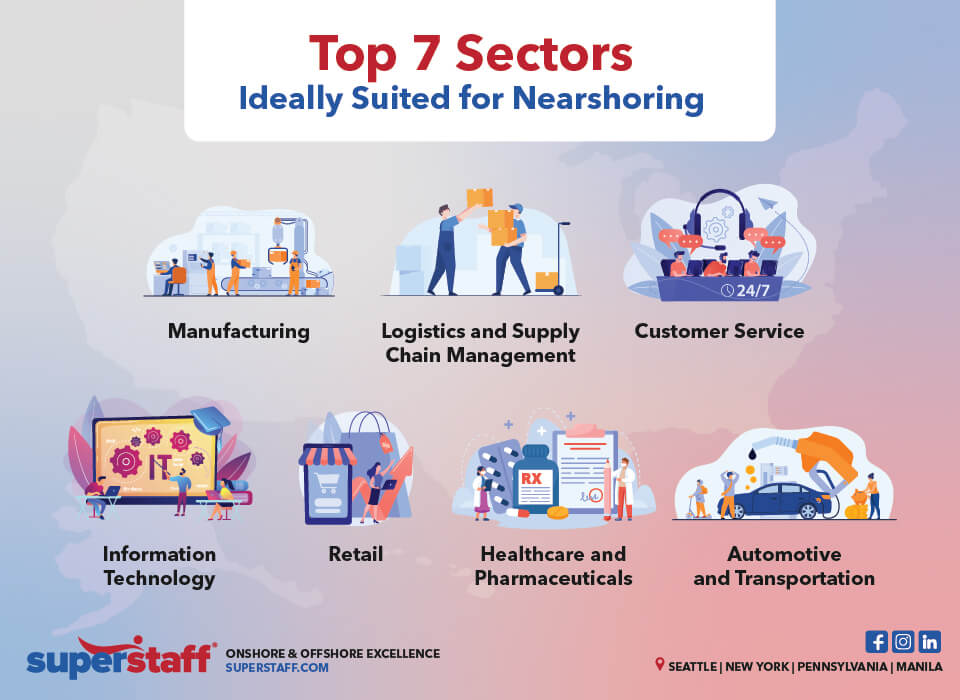
When people hear the word “outsourcing,” offshore destinations — much like the Philippines — are often the primary destinations that come to mind. Indeed, Philippine offshore outsourcing solutions are widely known because they offer a wealth of benefits for U.S. companies, enabling them to grow their business while saving on costs.
However, nearshoring is another often overlooked outsourcing option gaining more prominence in the post-pandemic world.
Unlike offshore outsourcing, where tasks are outsourced to faraway countries, nearshoring refers to the process of offloading job functions to neighboring countries. For instance, instead of outsourcing to China or India, which are both geographically far from the United States, American companies can hand over some of their operations to Mexico, Colombia, or other Latin American countries.
Generally speaking, nearshoring gives businesses the same benefits they receive from offshoring but with a few key advantages. This article will take a closer look at the key benefits of nearshoring and discuss which particular industries are best suited for this outsourcing solution.
The Indispensable Advantages of Nearshoring
Collaborate With Skilled Professionals From Neighboring Countries
One of the critical advantages of nearshoring over other outsourcing solutions is that it allows for easier communication and collaboration. Since the client is partnering with a nearby outsourcing location, there will be little to no time zone differences, allowing for real-time interactions and less difficulty scheduling meetings.
In addition, if the client feels the need to travel frequently to visit their overseas operations, nearshoring provides more opportunities for onsite visits. Traveling to a nearshore location will typically take only a few hours, significantly reducing your travel and accommodation expenses and helping you maximize your time investment.
Enjoy Fewer Linguistic and Cultural Barriers
Clear communication is essential for building strong relationships between a business and its outsourcing partner. The problem is that many U.S. companies face language barriers and cultural differences when working with offshore providers, sometimes causing misunderstandings and mistranslations.
Thankfully, opting for nearshoring solutions can help prevent these situations. Since nearshore locations are often only a few hours away from your home country, there will be fewer cross-cultural barriers.
Sharing a similar language and having a more closely aligned culture with your outsourcing partner can strengthen your relationship and make the decision-making process more manageable. For example, if you and your nearshore provider share common holidays and live in the same time zone, it’ll be significantly easier to plan schedules and deadlines that work for both parties.
Which Industries Are Best Suited for Nearshoring?
1. Manufacturing
The COVID-19 outbreak created massive disruptions for businesses of all industries, but one of the most affected sectors was, by far, the manufacturing industry. As global lockdowns, trade interruptions, and travel restrictions were implemented, manufacturing businesses had to halt production.
Even well-established companies like Apple, Toyota, and Honda took a hit from the manufacturing snafu, as many of their offshore factories ceased operations. Now, even as the world recovers from the pandemic, manufacturing companies will have to make significant changes to boost their resilience and future-proof their operations–and this is where nearshoring can come in handy.
Why Location Matters in Manufacturing
Before the pandemic, many global businesses offshored their manufacturing activities to China because of the cost-effective labor. However, more companies are now switching to nearshore locations to build protection in case another global crisis occurs.
In a 2020 Gartner survey, 33% of global business leaders said they either moved their sourcing and manufacturing operations out of China or are planning to do so within the next few years. Trade tensions between the U.S. and China have also resulted in a significant decline in the importation of manufactured goods. Instead, American businesses are accelerating imports from nearshore suppliers, such as those in Latin America.
The geographical proximity provided by nearshore outsourcing is crucial in manufacturing because it reduces moving items and goods costs, makes logistics and transportation more efficient and even simplifies tax-related legal and regulatory processes.
2. Logistics and Supply Chain Management
Offshore outsourcing offers many advantages for businesses, allowing them to scale up sustainably and improve their profit margins while simultaneously reducing the workload of their in-house employees. However, despite the many benefits of offshoring, COVID-19 has exposed a weakness in the logistics and supply chain industry.
At the height of the global pandemic, offshore factories were shut down, ports were congested, and cross-border trade was limited and restricted. These problems created a supply chain crisis that highlighted the importance of geographic proximity for logistics operations.
These drawbacks caused businesses to realize the strategic advantage of nearshoring to Latin America as a solution to their outsourcing woes. By closing the geographical distance between an American company and its outsourcing partner, any knots or bumps in the supply chain can be managed and resolved more quickly and efficiently, helping reduce travel costs and shipping expenses.
3. Customer Service
Customer support is one of the most commonly outsourced services onshore, offshore, or nearshore. The nature of the job doesn’t require the caller and the agent to be in the exact location.
However, there are significant advantages to nearshoring call center services. Compared to offshore workers, nearshore customer service reps may already be more familiar with American customers’ language, lifestyles, customs, communication styles, and other cultural nuances. As such, they may not require as much training as offshore employees.
Another benefit of nearshoring customer service is proximity. There will be little to no time zone differences, meaning there will always be call center agents available to answer calls during hours most convenient to American customers.
Many U.S. companies are discovering the benefits of outsourcing their customer service to nearby countries. Some examples include IBEX, Uber, and Amazon, which delegate customer support calls to Jamaica and Costa Rica.
4. Information Technology
The importance of information technology (I.T.) services cannot be overstated in today’s digital world. Tech companies are facing continued growth in consumer demand while simultaneously not having enough qualified workers to take on the opportunities. This is where outsourcing — and nearshoring, mainly — can be beneficial.
Many Western companies have found success by nearshoring their IT functions to Central and Latin American countries like Mexico, Brazil, and Colombia. The Latin American region experienced a 156% increase in tech hires from foreign countries in the past few years, highlighting the widespread acceptance of nearshore outsourcing post-pandemic.
Geographical Proximity + Collaboration = Innovation
Tech companies needing cross-border IT services can get a great deal by pulling their process closer to home. Nearshore outsourcing allows tech businesses to work in a similar time zone with their outsourcing provider, making it much easier to communicate and collaborate on urgent and essential projects.
Software projects, for example, require effective team communication throughout the development cycle. All members must actively participate in proposals, workflow development, and feedback sessions to provide course correction, improvement, or innovation opportunities.
In traditional offshoring, some team members may be difficult to reach during certain hours, and they may miss important information because of the nature of asynchronous communication. With an IT nearshoring partner, tech companies can easily schedule meetings with all team members, ensuring everyone is on the same page.

5. Retail
Retail businesses experience tight competition in today’s increasingly crowded global marketplace. Retailers are expected to deliver 24/7 omnichannel shopping experiences and face the challenge of standing out in a sea of similar online brands.
How can these retail companies keep overhead and labor costs in check without neglecting the customer experience? For many retailers, nearshore outsourcing can be the ideal solution.
One notable example of a retail business that has utilized nearshoring to its advantage is Zara, one of the biggest fashion brands in the world. About 10% of the Spanish clothing company’s production is outsourced to factories in Morocco and Turkey.
Other apparel brands hope to emulate Zara’s success, with industry leaders predicting that over 20% of their sourcing volume will be nearshored within the next three years.
6. Healthcare and Pharmaceuticals
Industry analysts have observed a rising trend in the healthcare and pharmaceutical sector: According to FedEx Healthcare® Solutions, more than 70% of their healthcare clients are choosing to outsource to nearby countries. More healthcare facilities are opting for nearshoring because it helps cut costs while allowing for greater levels of control and visibility.
The global demand for healthcare and pharmaceutical products and services during the pandemic skyrocketed. To meet the needs of their growing patient base, healthcare companies are devoting more resources to innovating and digitizing their business models, and nearshore outsourcing solutions are paving the way for their continued upward trajectory.
Several U.S. pharmaceutical companies have outsourced their medical manufacturing to nearby countries within their time zone. One example is Medtronic, a well-known medical equipment supplier which has been nearshoring to Mexico since the 1970s. This arrangement allows them to control their production process and reduce transportation expenses and supply chain problems.
7. Automotive and Transportation
One of the biggest challenges currently faced by the global automotive industry in recent months has been the semiconductor shortage brought about by the supply chain crisis. The inventory shortage is caused by production lines around the world being slowed or halted due to the pandemic.
Many North American automotive manufacturers have started focusing on nearshoring to address the scarcity. Working with semiconductor chip suppliers close to the U.S. can help automobile production bounce back from the pandemic-induced setbacks without driving costs through the roof.
Although the pandemic is accelerating the demand for automotive nearshoring, the widespread acceptance of this outsourcing solution started in 1925 when Henry Ford invested in a Mexican factory.
Leading automotive businesses like Volkswagen, GM, and Nissan also utilize nearshore outsourcing to run their operations. In fact, according to the International Trade Administration, 75% of America’s imported vehicles are manufactured in Mexico.
How Nearshoring to Colombia Can Help You Fill in the Labor Gaps
Now that you understand the advantages of nearshoring and which industries benefit most from this solution, it’s time to choose your ideal outsourcing destination. Nearshoring to Colombia can be an excellent strategic option for U.S. businesses looking to delegate tasks to a nearby country.
Known as “The Silicon Valley of Latin America,” Colombia has one of the region’s largest technically skilled populations, producing about 13,000 IT and engineering graduates yearly. This makes the country an ideal outsourcing location for many businesses, especially those that deal in technology or prioritize digital transformation.
The country also has close cultural ties to the U.S., little time zone differences, and a massive English-speaking population. Outsourced Colombian workers may be more accessible for American companies to collaborate and work with.
Read More: Why Nearshoring to Colombia Is an Excellent Strategic Option for US Businesses
Partner With SuperStaff for Onshoring, Nearshoring, and Offshoring Solutions
Are you ready to take your business to the next level? At SuperStaff, we offer a wide range of outsourcing solutions, whether onshore, nearshore, or offshore.
With strategic locations in the U.S., the Philippines, and Colombia, we aim to help businesses of all sizes open the doors of global expansion. Whether you need assistance with customer service, supply chain management, or IT services, you can count on our professional team to provide the customized solution you need to succeed.
Contact us today, and let’s discuss how our outsourcing services can help your business grow!






